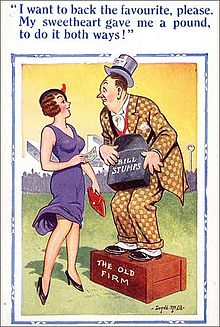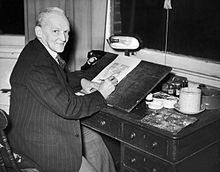- Donald McGill
-
Donald Fraser Gould McGill, (28 January 1875 – 13 October 1962) was an English graphic artist whose name has become synonymous with a whole genre of saucy seaside postcards that were sold mostly in small shops in British coastal towns. The cards feature an array of attractive young women, fat old ladies, drunken middle aged men, honeymoon couples and vicars.[1] He has been called 'the king of the saucy postcard', and his work is still collected and appreciated for his artistic skill, its power of social observation and earthy sense of humour. Even at the height of his fame he only earned three guineas a design,[2] but today his original artwork can fetch thousands of pounds.
Contents
Early life
McGill was born in London in 1875. He lost a foot in a school rugby accident, and, having studied at Blackheath Proprietary School where his best friend was a future Bishop of Wakefield, spent most of his life in the Blackheath area of south-east London (living at 5 Bennett Park, SE3 - a blue plaque location).
He was a naval draughtsman until his career in postcards began accidentally in 1904 when an in-law encouraged him after seeing an illustrated get-well card he had made for a sick nephew. Within a year it was his full-time occupation. He studied art and married the daughter of the owner of Crowder's Music Hall in Greenwich.
Artistic career
McGill spent virtually the whole of his career creating the distinctive colour washed drawings which were then reproduced as postcards. He ranked his output according to their vulgarity as mild, medium and strong, with strong being much the best sellers. His family, however was steadfastly respectable. He said of his two daughters: "They ran like stags whenever they passed a comic postcard shop".
During the First World War he produced anti German propaganda in the form of humorous post cards. His cards from this time period reflected on the war both from the opinion, as he saw it, of the men serving, as well as the realities facing the families remaining home. Cards dealing with the so-called "home front" covered issues such as war-time rationing, home service, war profiteers, spy scares, interned aliens, among other issues. Recruitment and "slackers" were other topics covered. Many cards were designed to appeal to the soldier who wished to send a card home to his sweetheart and these cards showed couples. Cards showed soldiers in training, and there were many lighthearted jokes about the Scottish soldier and his kilt. A few cards showed images of Nursing Sisters, and at least one showed three female Munition workers. Of all these cards, there were relatively few depicting a soldier in action. A number of the cards depicted men in the Navy. Of all the military themed post cards, only a few of these were serious – such as one showing a British Red Cross Medic caring for a wounded German soldier.
In 1941, author George Orwell wrote an essay on McGill's work entitled "The Art of Donald McGill".[3] Orwell stated that he was not sure if McGill was a real person or simply a trade name but concluded that in spite of the vulgarity and whatever the artistic merits of the cards, he would be sorry to see them go.
Approaching 80,[2] McGill fell afoul of several local censorship committees which culminated in a major trial held in Lincoln on 15 July 1954. The charge was breaking the Obscene Publications Act 1857. He was eventually found guilty and made to pay a £50 fine and £25 costs. The wider result was a devastating blow to the saucy postcard industry. Many postcards were destroyed as a result and retailers cancelled orders. Several of the smaller companies were made bankrupt as they survived on very small margins.
In the late 1950s, the level of censorship eased off and the market recovered. In 1957, McGill gave evidence before the House Select Committee set up in order to amend the 1857 Act.
Over the span of his career McGill produced an estimated 12,000 designs, of which 200 million copies are estimated to have been printed. He died in 1962 with all his designs for the 1963 season already prepared. He was buried in Streatham Park Cemetery in an unmarked grave[4]. Despite their wide circulation, McGill earned no royalties from his designs; in his will, his estate was valued at just £735.[2]
One of his postcards (featuring a bookish man and an embarrassed pretty woman sitting under a tree, with the caption: "Do you like Kipling?" / "I don't know, you naughty boy, I've never kippled!") holds a world record for selling the most copies at over 6 million.[5]
Museum
On 10 July 2010, Donald McGill's grandson Patrick Tumber opened the Donald McGill Postcard Museum in Ryde, Isle of Wight[citation needed]. In 1953, Ryde had witnessed police raids on five shops in the town and the seizure of over 5,000 postcards; the majority of them were by McGill.[6]
In popular culture
McGill's Kipling joke is used in a 1962 episode of The Beverly Hillbillies, "Pygmalion and Elly", in a scene between Elly May Clampett (Donna Douglas) and Sonny Drysdale (Louis Nye).
Bibliography
- Censored at the Seaside: The Censored Postcards of Donald McGill. Exhibition at Cartoon Art Gallery, London, May 25–July 31, 2004
- Buckland, Elfreda (1984). The World Of Donald McGill. Blandford. ISBN 0-7137-1400-X.
- Calder-Marshall, Arthur (1966). Wish You Were Here, The Art of Donald McGill. Hutchinson of London. ISBN 0-09-080061-3.
- Orwell, George (September 1941). "The Art of Donald McGill". Horizon Magazine (London).
- Sutton, David (2000). A chorus of raspberries: British film comedy 1929–1939. Exeter: University of Exeter Press.
References
- ^ Buckland, E (1990). The World of Donald McGill. London: Blandford. ISBN 071371400X.
- ^ a b c Ian Herbert (2006-09-08). "Postcards kept under wraps for 40 years set to fetch £50,000". London: The Independent. http://www.independent.co.uk/news/uk/this-britain/postcards-kept-under-wraps-for-40-years-set-to-fetch-16350000-415110.html. Retrieved 2006-09-19.
- ^ George Orwell (September 1941). "The Art of Donald McGill". First published: Horizon, London. http://www.orwell.ru/library/reviews/McGill/english/e_mcgill. Retrieved 2007-07-01.
- ^ Randall, David; Anderson, Tom (16 October 2005). "Comic Postcard Legend Lies In An Unmarked Grave". The Independent (London). http://www.independent.co.uk/news/uk/this-britain/comic-postcard-legend-lies-in-unmarked-grave-511161.html.
- ^ 1978 American paperback edition of the Guinness Book of World Records. Since that time, records related to postcards have been discontinued.
- ^ Nick Collins (5 August 2010). "Bawdy seaside postcards on display". The Telegraph. http://www.telegraph.co.uk/news/newstopics/howaboutthat/7928443/Bawdy-seaside-postcards-on-display.html. Retrieved 12 September 2011.
External links
- BBC 4 - Censored at the Seaside: Donald McGill 10 postcards
- World War One propaganda cards by McGill
- BBC Radio 4 account of the 1954 trial Includes a selection of offending cards.
- George Orwell's essay on his work and also here [1]
- Images of McGill at work 1949 to 1951 at Viewimages.com - Accessed October 2007
- BBC News report from the opening of the Donald McGill Museum in Ryde
Categories:- 1875 births
- 1962 deaths
- British comedy and humour
- English illustrators
- Postcard artists
- Obscenity controversies
- People educated at Blackheath Proprietary School
Wikimedia Foundation. 2010.


